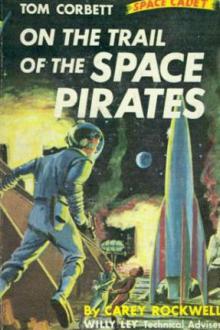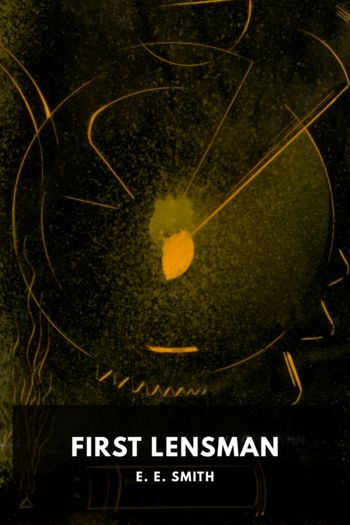Triplanetary - E. E. Smith (phonics reader TXT) 📗

- Author: E. E. Smith
Book online «Triplanetary - E. E. Smith (phonics reader TXT) 📗». Author E. E. Smith
“Got any idea how fast we’re going?” Rodebush demanded, glancing up for an instant from the observation plate. “We should be able to see him, since we could hear him, and our range is certainly as great as anything he can have.”
“No. Can’t figure velocity without any reliable data on how many atoms of matter exist per cubic meter out here.” Cleveland was staring at the calculator. “It’s constant, of course, at the value at which the friction of the medium is equal to our thrust. Incidentally, we can’t hold it too long. We’re running a temperature, which shows that we’re stepping along faster than anybody ever computed before. Also, it points out the necessity for something that none of us ever anticipated needing in an open-space drive—refrigerators or radiating wall-shields or repellers or something of the sort. But to get back to our velocity—taking Throckmorton’s estimates it figures somewhere near the order of magnitude of ten to the twenty-seventh. Fast enough, anyway, so that you’d better bend an eye on that plate. Even after you see them you won’t know where they really are, because we don’t know any of the velocities involved—our own, theirs, or that of the beam—and we may be right on top of them.”
“Or, if we happen to be outrunning the beam, we won’t see them at all. That makes it nice piloting.”
“How are you going to handle things when we get there?”
“Lock to them and take them aboard, if we’re in time. If not, if they are fighting already—there they are!”
The picture of the speedster’s control room flashed upon the speaker.
“Hi, Fritz! Hi, Cleve! Welcome to our city! Where are you?”
“We don’t know,” Cleveland snapped back, “and we don’t know where you are, either. Can’t figure anything without data. I see you’re still breathing air. Where are the Nevians? How much time have we got yet?”
“Not enough, I’m afraid. By the looks of things they will be within range of us in a couple of hours, and you haven’t even touched our detector screen yet.”
“A couple of hours!” In his relief Cleveland shouted the words. “That’s time to burn—we can be just about out of the Galaxy in that. …” He broke off at a yell from Rodebush.
“Broadcast, Spud, broadcast!” the physicist had cried, as Costigan’s image had disappeared utterly from his plate.
He cut off the Boise’s power, stopping her instantaneously in mid-space, but the connection had been broken. Costigan could not possibly have heard the orders to change his beam signal to a broadcast, so that they could pick it up; nor would it have done any good if he had heard and had obeyed. So immeasurably great had been their velocity that they had flashed past the speedster and were now unknown thousands—or millions—of miles beyond the fugitives they had come so far to help; far beyond the range of any possible broadcast. But Cleveland understood instantly what had happened. He now had a little data upon which to work, and his hands flew over the keys of the calculator.
“Back blast, at maximum, seventeen seconds!” he directed crisply. “Not exact, of course, but that will put us close enough so that we can find ’em with our detectors.”
For the calculated seventeen seconds the super-ship retraced her path, at the same awful speed with which she had come so far. The blast expired and there, plainly limned upon the observation plates, was the Nevian speedster.
“As a computer, you’re good, Cleve,” Rodebush applauded. “So close that we can’t use the neutralizers to catch him. If we use one dyne of drive we’ll overshoot a million kilometers before I could snap the switch.”
“And yet he’s so far away and going so fast that if we keep our inertia on it’ll take all day at full blast to overtake—no, wait a minute—we could never catch him.” Cleveland was puzzled. “What to do? Shunt in a potentiometer?”
“No, we don’t need it.” Rodebush turned to the transmitter. “Costigan! We are going to take hold of you with a very light tractor—a tracer, really—and whatever you do, don’t cut it, or we can’t reach you in time. It may look like a collision, but it won’t be—we’ll just touch you, without even a jar.”
“A tractor—inertialess?” Cleveland wondered.
“Sure. Why not?” Rodebush set up the beam at its absolute minimum of power and threw in the switch.
While hundreds of thousands of miles separated the two vessels and the attractor was exerting the least effort of which it was capable, yet the super-ship leaped toward the smaller craft at a pace which covered the intervening distance in almost no time at all. So rapidly were the objectives enlarging upon the plates that the automatic focusing devices could scarcely function rapidly enough to keep them in place. Cleveland flinched involuntarily and seized his armrests in a spasmodic clutch as he watched this, the first inertialess space-approach; and even Rodebush, who knew better than anyone else what to expect, held his breath and swallowed hard at the unbelievable rate at which the two vessels were rushing together.
And if these two, who had rebuilt the super-ship, could hardly control themselves, what of the three in the speedster, who knew nothing whatever of the wonder-craft’s potentialities? Clio, staring into the plate with Costigan, uttered one piercing shriek as she sank her fingers into his shoulders. Bradley swore a mighty deep-space oath and braced himself against certain annihilation. Costigan stared for an instant, unable to believe his eyes; then, in spite of the warning, his hand darted toward the studs which would cut the beam. Too late. Before his flying fingers could reach the buttons the Boise was upon them; had struck the speedster in direct central impact. Moving at the full measure of her unthinkable velocity though the super-ship was





Comments (0)